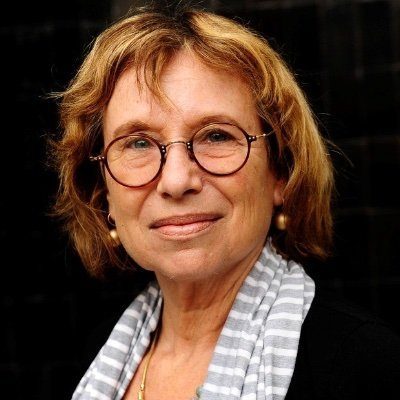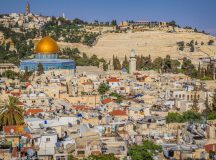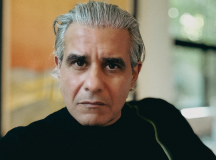Following news of a ceasefire in Gaza and the return of the 20 remaining living hostages, Fathom asked Israelis and Palestinians to consider issues that both peoples need to grapple with at this time. Fania Oz-Salzberger is is an Israeli historian, writer and activist.
Almost as crucial as the question ‘What do Israelis need to hear right now?’ is the follow-up question, ‘And from whom?’ The answer to the latter question is manifold: from their own fellow-citizens, from the global community, from trusted friends abroad, from Donald Trump. Above all, a good leader should be able to tell his or her own people hard and uncomfortable truths. The current Israeli leadership is not up to the challenge.
There may still be a road out of the moral and political disaster which Benjamin Netanyahu, his extreme-right coalition partners and some of their voters are bringing upon Israel. It will never be the same Israel; it will have both sad and bad memory to carry; it will bear grief and moral shame. But it just might be able to repair its democracy, and perhaps even reach a peace agreement with the Palestinians. This is a tough road, and it involves telling people several painful truths.
In parallel, of course, Palestinians too must face reality, but that is up to them. I can only suggest that the truths Palestinians must hear are as painful and disenchanting as those on the Israeli side. At best, our tragic conflict will be resolved as my father once described a tragedy by Chekhov. ‘At the end of a Shakespearean tragedy,’ he wrote, ‘the stage is strewn with dead bodies and maybe there’s some justice hovering high above. A Chekhov tragedy, on the other hand, ends with everybody disillusioned, embittered, heartbroken, disappointed, absolutely shattered, but still alive.’
Here are the truths that my fellow-Israelis need to hear, and the people they might hear them from.
1
Dear Israelis, the war that was fought in Gaza in your name and mine, by soldiers who are our flesh and blood, shifted months ago from a just war with an iron-clad casus belli, into a brutal, cruel, vengeful and cynical carnage of innocent civilians and infrastructure. This war, the worst in Israeli history, was waged according to the whims of a self-serving would-be autocrat and his corrupt cohort, alongside the ultra-nationalist and racist parties upon which his coalition depends. These leaders have squandered every last scrap of moral justification we had, our civilians’ courage, our soldiers’ bravery and the world’s – at least the sane world’s – ample empathy of two years ago. So many sacrifices were made in vain. Our country is being accused of genocide, and there is enough evidence to prove that it is committing serious war crimes, probably crimes against humanity.
This horrendous truth is already being told in Israel, by a few brazen and honest voices: Nir Hasson and other journalists of the liberal daily Haaretz, and a handful of politicians such as Yair Golan, leader of the Democrats party, and Knesset member Rabbi Gilad Kariv.
By contrast, numerous journalists and public influencers, discussing Gaza on the main television channels, are fully aware of the atrocities but prefer to mediate them to their audience through a tight filter, quoting ‘morale’, fearing unpopularity. As to foreign channels and social media, many Israelis simply refuse to be exposed to disturbing footage.
A minority – a loud and ugly one – rather than denying the scale of the horror, is celebrating the death and destruction of Gazan civil life with cruel glee; the same crowd also wishes hell upon all ‘lefties’, liberals, peace seekers. You could argue that every society in the world has its inhumane extremists, but to Israel’s misfortune these gloaters are well represented in Netanyahu’s government.
To this day, when I speak to some friends and colleagues about the Gaza catastrophe, they maintain a flat denial: this can’t be. Surely the IDF is acting according to its moral code and the laws of war. Others return to the fresh, open wound of 7 October. Shocked people, however kind and thoughtful, seem emotionally unavailable to their enemy’s innocents. I think this is also true for many decent Palestinians, but this is cold comfort indeed.
2
Dear Israelis, the deep trauma of 7 October is a living and ongoing catastrophe only for us.
Most of the world has ‘moved on’. Of course, some good international friends cared deeply for the hostages, living or dead. However, no one in the world is in regular touch, as many of us are, with bereaved families, Nova Festival survivors, or relatives of living and murdered hostages. No one but us hears new horror stories and recollections from shocked massacre survivors who took many months to be able to talk and tell. During the last month alone, Israelis heard reports from two 7 October survivors who spoke for the first time, watched the funeral of yet another young man from the Nova festival who died by suicide, and began hearing the stories of torture and starvation from the 20 living hostages returned in the recent deal. As bodies of dead hostages are being returned, we cannot avoid the thought of their horrific, and sometimes slow, deaths in captivity. Untimely death and grief are our daily companions.
For the rest of the world, our open wound is old news. Some are particularly cruel about it. ‘Why do you keep harping on 7 October?’, a pro-Palestinian woman asked me on Twitter, as if I were a cunning demagogue. A precious few understand the impact of collective trauma, both Israeli and Palestinian. As someone wisely paraphrased, ‘From the River to the Sea / What we need is therapy’. Now that a ceasefire seems to have been achieved, and during the long road to an agreement, our part of the Middle East will need a tremendous amount of healing.
Difficult truths are an essential prelude to healing. Let me continue to the next one.
3
Dear Israelis, the world is not all antisemitic.
No one has diluted the core meaning of this sensitive term more than the current Israeli government. Its diplomatic approach to the world often involves hurling accusations of antisemitism at legitimate and well-meaning critics of Israel, with the same indignant passion that ought to be used against genuine antisemites. Let’s make it crystal clear: assaulting Jews for the sin of being Jews is antisemitic; accusing Israel of war crimes in Gaza is certainly not.
However, accusing only Israel of war crimes while absolving Hamas, Islamic Jihad, Russia, Sudan and every other criminal out there is a deeply suspect practice. I would call it the singling-out antisemitism. The UN human rights commission is a case in point.
There’s a slippery slope between these two stances. For example, denying Israel’s right to exist is dangerously close to antisemitism, because Israel is the only state of the Jews. (This, incidentally, was Theodor Herzl’s original phrase. Not Jewish State). This applies to people who heartily support the rights and liberty of every other national group, especially the Palestinians. Such people also tend to deny the self-definition of many Jews as a nation, as well as a religion and a cultural legacy. ‘You are only a religion’, some Twitter types tell me, eager to police my identity. So yes, dictating to the Jews what they are and what they aren’t, and concluding that we do not deserve statehood, is akin to blatant antisemitism. The same goes for the whole noisy crowd of ‘I don’t hate Jews, I only hate Zionists’.
Yes, the “global Left” is aggressive, hypocritical and ignorant when it demonises Israel and, at its worst, embraces Hamas. When asked whether I am disappointed of my erstwhile ideological partners, I answer that this kind of Left were never my partners. I remember long conversations with my father since the 1990s, during the meteoric rise of current identity politics, which banks on facile postcolonial theory, slates Israel as an illegitimate settler state, and sees the Palestinians as eternal victims. We both agreed that this cult of victimhood is not our Left, and no longer carries the DNA of liberalism or social democracy.
The Enlightenment legacy of the moderate Left – which still includes many friends of Israel – would allow no crass geographical division of the globe into perpetrators and victims, and insist on civil equality for all, based on humanity rather than ethnicity. I am proud of belonging to that liberal and social Left. If disappointment is in order, it is the disappointment of such moderate friends of Israel with its current leadership, policy and behaviour.
Our prime minister and his spokespeople continually tell the nation that Israel is currently disliked simply because everyone’s an antisemite out there. On this topic as on others, he is cynically misleading his citizens. Too many Israelis are thus turned against genuine friends in need, and against people concerned for both Israel and the Palestinians.
Once again, only a handful of media voices challenge the ‘world is against us’ tune. Western leaders eager to persuade the Israelis of their friendship seem unaware that some Netanyahu-oriented media (such as the privately owned channel 14) and social media are vilifying and disparaging them on a constant basis.
This truth must be spelled out by Jews and non-Jews, Israelis and non-Israelis alike.
4
Dear Israelis, the leader whom about 30 or 40 per cent of you still esteem, or even worship, is both a domestic and an international criminal.
Following his indictment on three charges of corruption, in 2020 Netanyahu was allowed by the Supreme Court to become prime minister only if he refrains from dealing with legal matters and with legislation touching on the judiciary. Since January 2023, with his trial dragging on and having launched Israel’s first extreme-right coalition government, he has meddled with numerous cases of legal and judicial decision-making. This is prima facie a felony of contempt of court. Furthermore, significant part of his coalition’s legislation is unconstitutional, but the harassed and threatened Supreme Court cannot rule against the whole barrage.
After 7 October, while no law on the books imposed a resignation and new elections, Netanyahu has been holding on to his seat, sacking his own minister of defence alongside the IDF chief of staff and the head of Shin Bet before moving on to his current assault against the attorney general. Members of his circle have already made threats against the judges in his own trial. They also brutalise ordinary citizens protesting against the government. Most recently, after Trump compelled Netanyahu to sign the ceasefire deal and our remaining living hostages came home, a new orchestrated attack has begun against – hold tight – the hostages’ relatives, and even the returnees themselves. They are blamed for not thanking Netanyahu.
As for our standing abroad, dear Israelis, we all know of the arrest warrant against Netanyahu and Gallant issued by the International Criminal Court in the Hague. Naturally, we were told by the media that it’s yet another case of dire antisemitism. Please begin to suspect that it’s not. The ICC may well be rigged. Its neighbour, the International Court of Justice, is not above prejudice either. But the mounting evidence against Netanyahu and his war cabinet is not prejudice. In normal times, Israel’s own judiciary would have dealt with it via a State Commission of Inquiry. Ironically, Netanyahu is indicted in the international courts because he flatly refused to set up such a Commission in accordance with long-standing tradition in Israel.
But who can tell this truth to the so-called Bibists and the extreme right voters? In the 1990s, former Prime Minister Yitzhak Shamir, Netanyahu’s predecessor as head of Likud, warned against this dangerous, untrustworthy man. A stream of ousted old-school Likud politicians and disgraced aids repeated his message. Of course, the Israeli Left did, too. The new generation of Likud, hand-picked by Netanyahu, are extreme right and fiercely loyal to the leader. They couldn’t care less.
Today, roughly one third of the voters still trust Netanyahu; some, including Knesset members, speak of him in messianic terms as God’s emissary. As in Trump’s America, his political opponents are demonised every time they try to warn his believers – for that’s what they are – of the immense damage, pain and danger inflicted on all Israelis.
It is tragic to observe that relatives of 7 October victims and hostages who had trusted Netanyahu are now physically assaulted in legal demonstrations against him. The assaulters are both police (Ben Gvir’s domain) and Netanyahu fans who still think that “Bibi” can do no wrong.
Only fellow-Israelis can persuade these single-minded believers that they had been misled. Otherwise, our increasing calamity will.
5
Dear Israelis, ‘if we don’t set up two states here, and soon, this land will become one state, and eventually an Arab state’, said my late father, Amos Oz, in 2015.
I have the dubious benefit of having lived through the 7 October massacre, which blissfully my father did not live to see. Some Israelis are prone to deduce from it that there can never be an independent next-door Palestine after that massacre. I beg to differ – and fortunately I am not alone. Israelis of our mindset argue that it’s actually the ‘one state’ that is the impossible solution. A unified Israel-Palestine, with everyone living ever after in happy co-citizenship, cannot happen in our generations. But two states, with Palestine effectively demilitarised, are viable – after a long and very careful process. My view of the future Palestine is not starry-eyed but extremely cautious. But as things now stand, it is the least bloody scenario.
Likud leaders and the ultra-right parties tell us that a State of Palestine is not an option. That a State of Palestine is a travesty. That a State of Palestine must necessarily mean, in Netanyahu’s words, ‘a terror state in the heart of Israel’.
This statement is deeply manipulative, precisely because it pretends to cater to our genuine fears, to our worst nightmares that came true on 7 October 2023. But it does not. Instead, it leaves us with the same fear and no hope.
‘If there are no two states here, and soon, I do not envy my children and grandchildren’, my father said elsewhere, in his ‘Last Lecture’, months before he died in 2018. Like him, I am a moderate Zionist, who believes in a secure and peaceful Israel next door to a secure and peaceful Palestine. In fact, anyone endorsing the two states solution such as UK Prime Minister Keir Starmer are moderate Zionists by definition. Mahmoud Abbas’s recent UN speech is also well within the category. Because moderate Zionism simply means a state for the Jews within their ancestral homeland. It can easily and logically encompass its Palestinian neighbour too.
Extremist Zionism, by contrast, just like fanatical Islamism or zealous ‘pro-Palestine’ stances, wants it all, river to sea and even beyond. After all, didn’t biblical Israel thrive on both banks of the River Jordan? For the present moment, the Smotrichs and Ben Gvirs of our country are willing to leave the Kingdom of Jordan alone, but they claim Jewish ownership on Gaza and the West Bank and east Jerusalem. They want the Third Temple built in lieu of the Al Aqsa Mosque. And then the Messiah will come.
This worldview, dear Israelis, is no longer Zionism. It is the fanatical, supremacist and violent contradiction of the pragmatic movement led by Theodor Herzl. Zionism was a spectrum of opinions, but the mainstream strove to create a modern, liberal-democratic state of the Jews, at peace with its neighbours, with civil equality for its non-Jewish citizens, and – this was made very clear – a member of the family of nations, what today we call the global community. Zionism was based on long Jewish tradition and memory, but it was anti-Messianic in a deep sense: it believed in human agency rather than divine intervention.
To hear this truth, Israelis must go back to the writings of our founders, especially Herzl and Weizmann, and to our excellent Declaration of Independence of 1948.
6
Dear Israelis, the Messiah is not a working plan, even if a small but powerful minority of Smotrich voters, backed by a few charismatic rabbis, thinks that it is. Nor is ‘a people that dwells alone’. Nor ‘God will provide’. The last time our people rebelled against a great empire, the Second Temple was destroyed, and we went on a two-millennia exile. The last time some of our rabbis relied on ‘God will provide’, they and their believers were marched to the death camps.
Zionism was our parents’ and grandparents’ ‘never again’. But it was never merely Jewish nationalism. The core idea was a return to ‘the family of nations’ on our own ancestral land, a movement of hard-working pioneers, followed by over a million refugees from the Nazis and the Arab countries. That is why its leaders constantly sought international support and legal approval. Zionism was Herzl and his humanism, Weizmann and his cautious diplomacy, the kibbutzim with their social democracy and modern agriculture. Theirs was a consciously human-made political culture. ‘No miracle happened to us’, as the famous Hebrew song says.
7
Dear Israelis, our history, our national story, as told to us by grandparents and schoolteachers, can and should undergo some perusal. We need to know that we were not always right, not always humane, not always wise. I admire and justify my four grandparents’ vision, as they escaped Nazifying Europe to found a sane and peaceful liberal democracy for the Jews in their ancestral land. But the Palestinian calamity is real. The Naqba is as real as our War of Independence, regardless whose guilt it was (and I tend to ascribe more guilt to the Palestinians’ horrible leadership). Both stories are flawed, and both stories stand.
We need to stop expecting miracles. We need to deradicalise. In some sense, to return to our roots – Jewish, early Zionist, also our genuine liberal-democratic roots. In another sense, to gaze to the future with some viable and responsible hope. We need to heal.
Israel’s civil society has proven its worth, its strength and its values over the last two or three years. It is capable of restoring democracy and solidarity, alongside security and honest governance. The next government may well be able to reflect these values. It might even be able to make peace.
Provided that the Palestinian can experience a parallel healing. Provided that both sides get far better leaderships. Provided that the global community is finally able, in this chaotic era, to empower the moderates. And provided that hard truths are told and heeded.



































